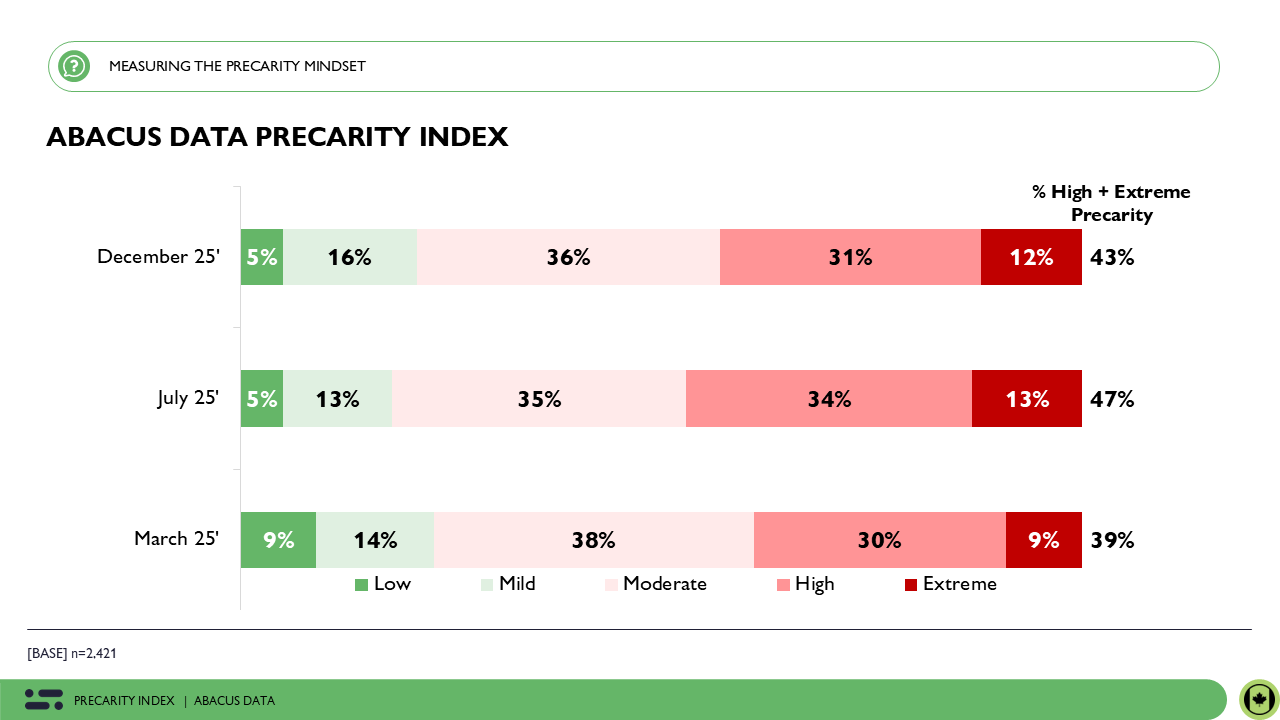Canadians want a recovery that is ambitious, fair, and makes the country more self-sufficient.
May 22, 2020
For video interviews by Skype or Zoom or audio interviews, please contact David at 613-884-4730 or david@abacusdata.ca
In early May, the Broadbent Institute commissioned Abacus Data to conduct a national public opinion survey to explore the kind of recovery Canadians want after the COVID-19 pandemic.
The survey found:
FINDING 1:
By a 2 to 1 margin (64% to 36%), Canadians want governments to spend whatever is required to rebuild and stimulate the economy, even if it means running large deficits for the foreseeable future, rather than reduce spending and get the budget deficit in control, even if it means a slower recovery.
FINDING 2:
Many Canadians believe that critical parts of Canada’s social safety net require improvements, especially the long-term care system.
FINDING 3:
Most Canadians say that it is essential to them that the economic recovery helps to make Canada more self-sufficient, is fair and ensures those with the most contribute the most, that it includes investments in the health care system and young Canadians, and that it helps transition to a low-carbon economy.
FINDING 4:
77% support governments providing financial assistance and debt relief to municipalities to help with budget shortfalls.
FINDING 5:
3 in 4 Canadians (75%) support implementing a wealth tax of 1% to 2% of the value of assets of Canada’s wealthiest people to help pay for the recovery.
FINDING 6:
8 in 10 Canadians (81%) believe that companies receiving government assistant should be required not to use foreign tax havens, and not use the money for excessive salaries, share buybacks, or increasing dividends, rather than allowing companies to decide how best to run their businesses.
Here are more detailed findings from the survey:
CANADIANS, BY A 2 TO 1 MARGIN, WANT GOVERNMENTS TO SPEND WHATEVER IS NECESSARY RATHER THAN CONTROL THE DEFICIT
Almost two in three Canadians feel it is vital that governments spend whatever is necessary to rebuild and stimulate the economy, even if it means running large deficits for the foreseeable future. One in three (36%) believe that when the worst of the pandemic is over, governments should reduce spending, if it means a slower recovery.
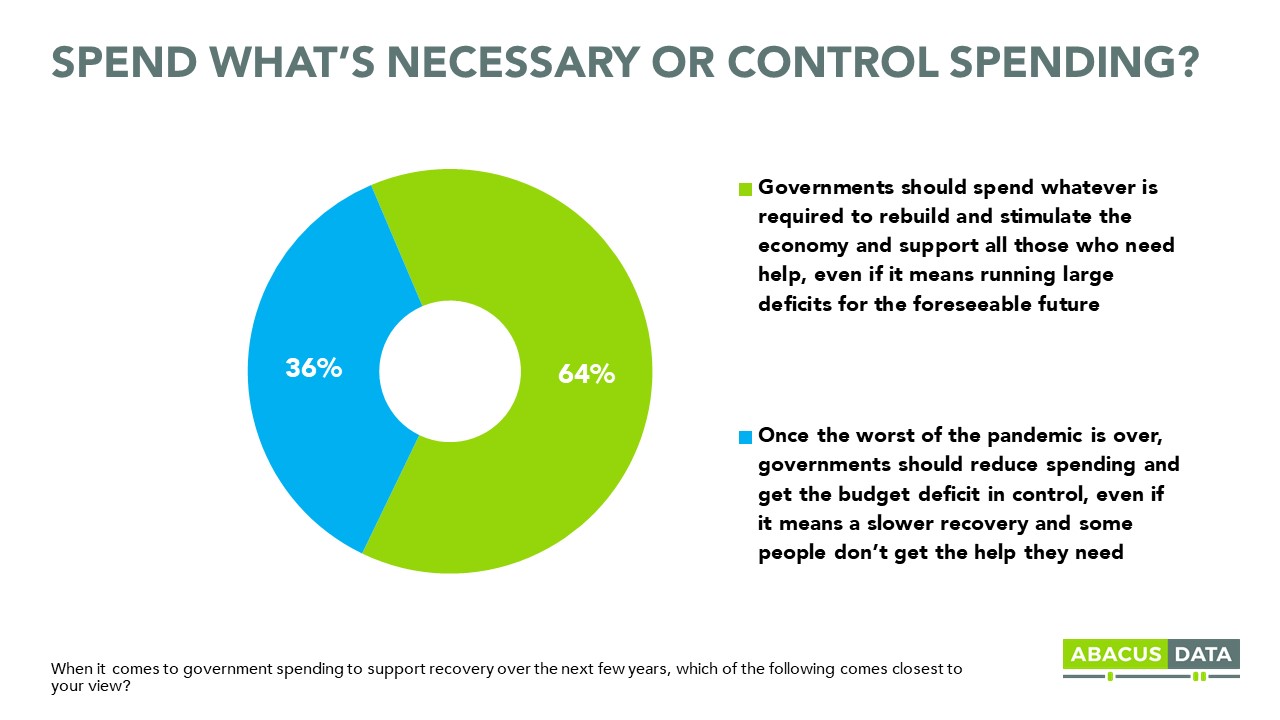
Clear majorities in all parts of the country, among men and women, and across all age groups prioritize spending to rebuild rather than deficit controls. About 3 in 4 of those who voted Liberal, NDP, and Green in 2019 feel that spending should be the priority, as do 46% of Conservative voters.
CANADIANS THINK THE LONG-TERM, HEALTH SYSTEM, AND EMPLOYMENT STRUCTURE NEEDS A LOT OF IMPROVEMENT.
Almost all Canadians believe that the long-term system for ageing Canadians requires either a lot of improvement or some improvement. A large majority also believes that improvement is needed for the public health system, for the availability of paid sick days and livable wages for all workers, and income support and employment insurance that everyone can access.
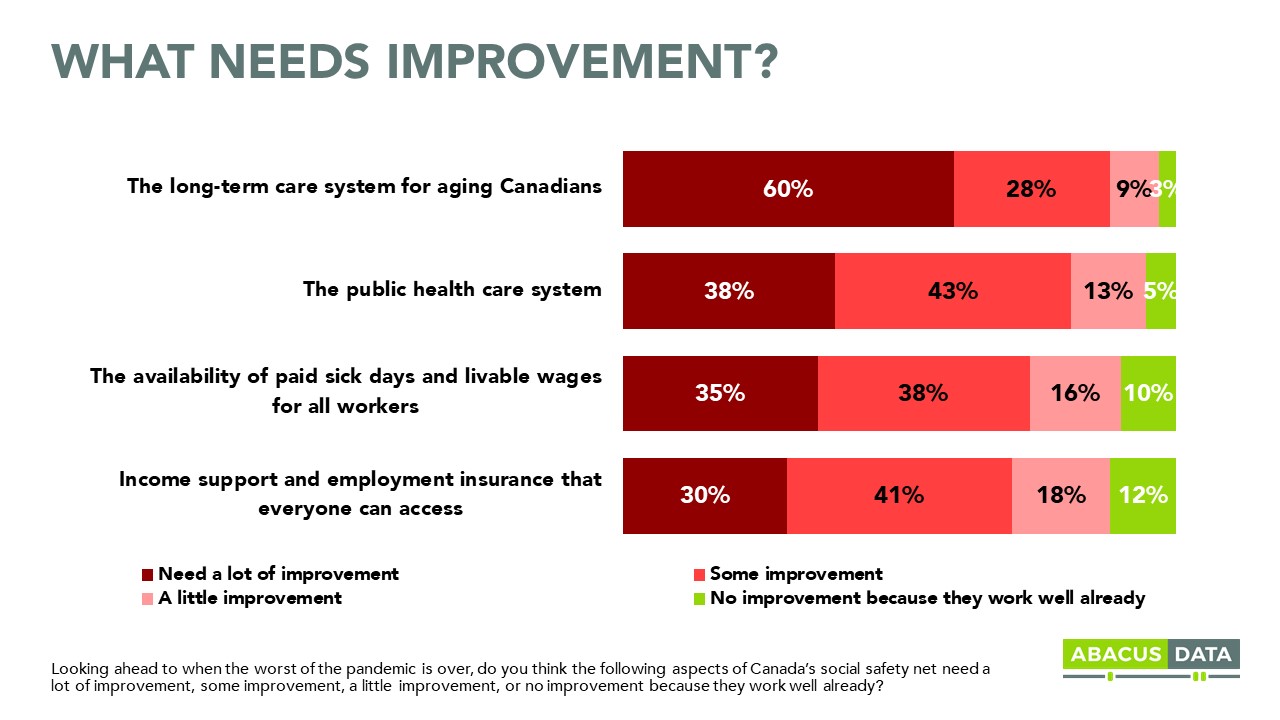
Demand to see the long-term care system improved a lot is high across the country, 9-points higher among women (64% women vs. 55% women) and increases among older Canadians, although 80% of younger Canadians feel the system needs a lot of some improvement. Improving the long-term care system also crosses political groups as clear majorities of Liberal, Conservative, and NDP voters think it needs a lot of improvement.
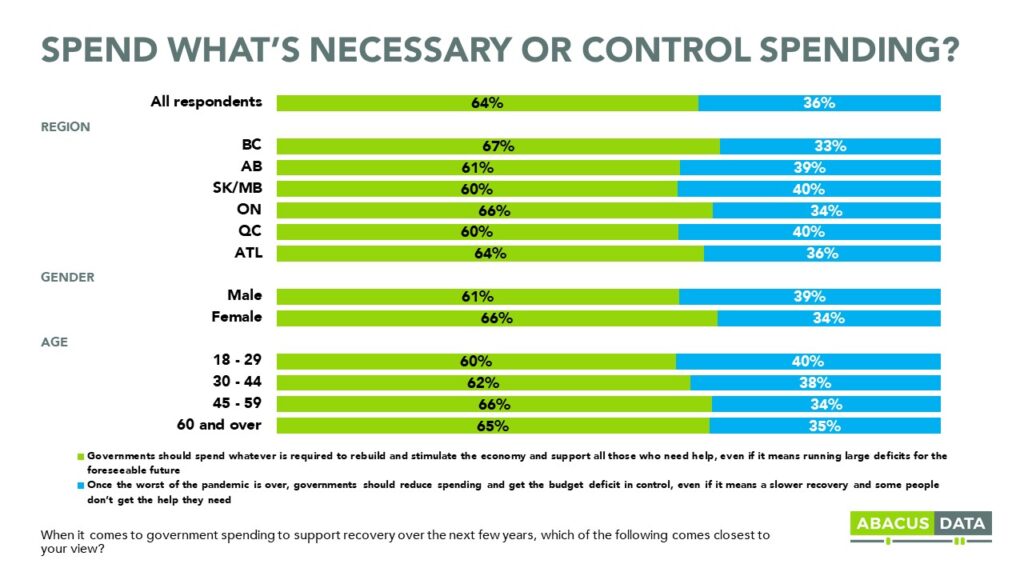
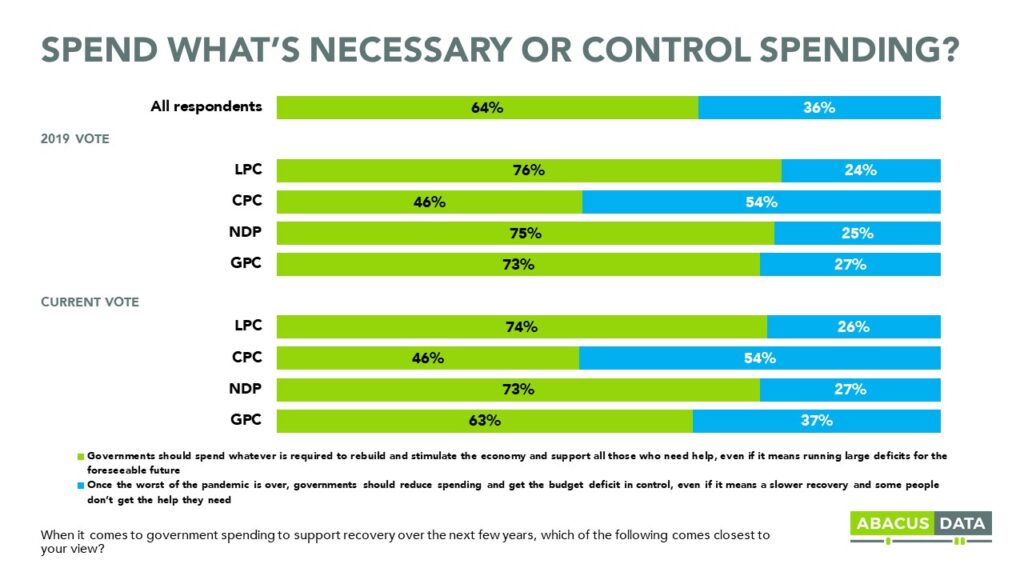
When it comes to income support and employment insurance changes, 71% believe the system needs a lot or some improvement. This view is higher among lower-income Canadians and those who are currently unemployed or laid off.
72% of Liberal, 63% of Conservative, and 78% of NDP voters think the income support and employment insurance system needs improvement to ensure everyone can access the program.
Most Canadians also think improvements are needed to the availability of paid sick days and livable wages for all workers. This is especially true among women and younger Canadians who are more likely to think the system needs a lot or some improvement.
Liberal, NDP, and Green voters are more likely to think the system needs improvement than Conservatives, although a majority in every voter group thinks it needs at least some improvement.
CANADIANS WANT AN ECONOMIC RECOVERY THAT IS FAIR, MAKES THE COUNTRY MORE SELF-SUFFICIENT, AND INVESTS IN THE PUBLIC HEALTH CARE SYSTEM.
Respondents were shown a list of criteria that governments could follow in developing policies around the economic recovery and asked how important, if at all, the requirements were to them.
Overall, Canadians said it was extremely or very important to them that the economic recovery:
• Builds Canadians ability to produce key products like food and medical supplies here instead of relying on global markets (79% extremely or very important).
• Invests in strengthening the health system, including universal public pharmacare (72% extremely or very important).
• It doesn’t let richer Canadians off the hook for contributing their fair share (71% extremely or very important).
• It helps people who need it the most (71% extremely or very important).
• Focuses on helping people and prevents corporations from using funds for excessive executive pay, stock buy-backs, or increased dividends (70% extremely or very important).
• Ensures younger Canadians are not permanently set back because of the economic crisis (64% extremely or very important).
• Invests to help Canada transition to a clean, low-carbon economy (53% extremely or very important).

3 IN 4 CANADIANS SUPPORT A WEALTH TAX ON CANADA’S WEALTHIEST PEOPLE TO HELP PAY FOR THE RECOVERY.
Three-quarters of Canadians (75%) either strongly support (44%) or support (31%) implementing a wealth tax of 1% to 2% on the assets of Canada’s wealthiest people.
Opposition is limited at 13%.
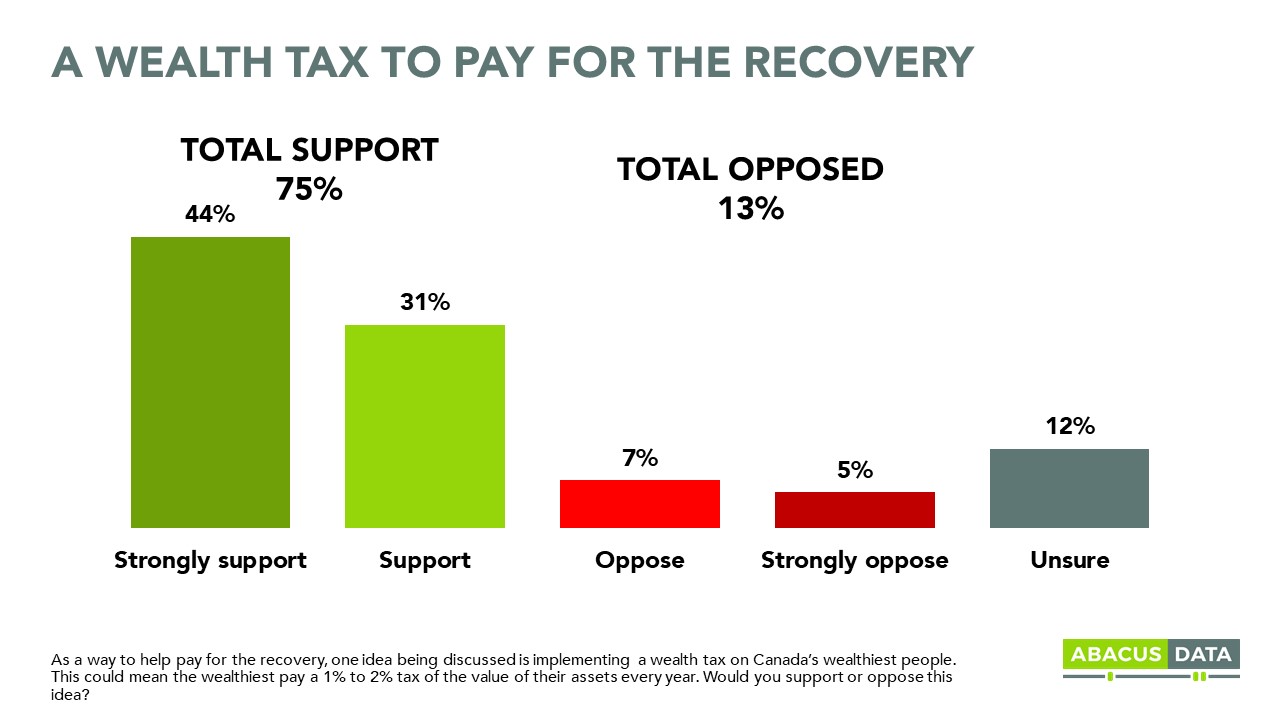
Support for a wealth tax is consistent across the country, from 90% in BC, 75% in Alberta, and 86% in Ontario to 74% in Quebec and Atlantic Canada. Support for a wealth tax is also highest among Canadians aged 60 and over (83%).
Politically, a wealth tax finds broad support among Liberal, NDP, and Green Party supporters but also among Conservative voters. 69% of Conservative Party voters in 2019 either strongly support (37%) or support (32%) a wealth tax of 1% to 2% on Canada’s wealthiest people.

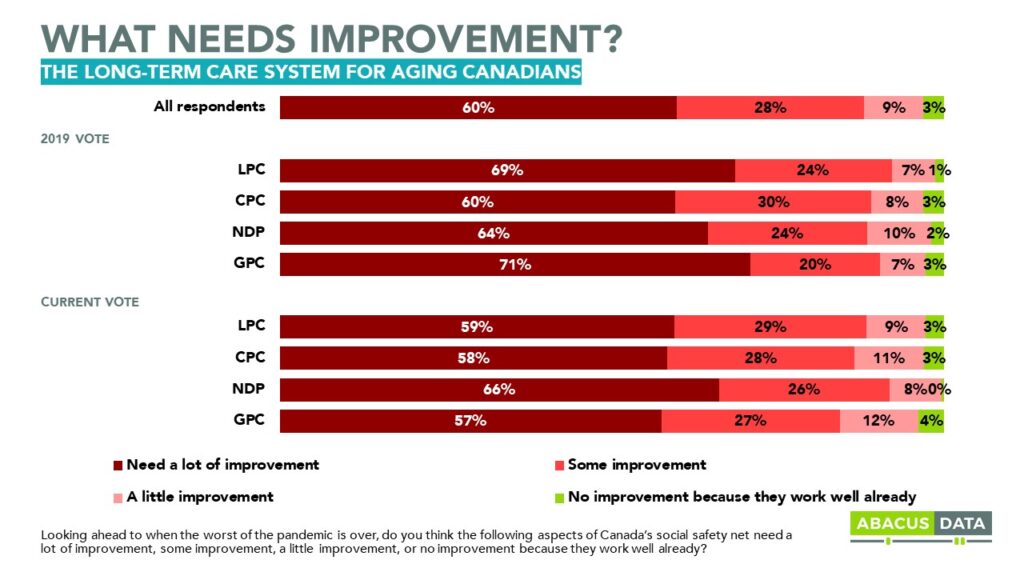
77% SUPPORT GOVERNMENTS PROVIDING FINANCIAL ASSISTANCE AND DEBT RELIEF TO MUNICIPALITIES TO HELP WITH BUDGET SHORTFALLS.
There is also broad support for governments providing financial assistance and debt relief to municipalities. 77% support it while 8% are opposed. Views are consistent across the country and demographic groups.

8 IN 10 CANADIANS WANT GOVERNMENT TO ENSURE PUBLIC FUNDS TO ASSIST CORPORATIONS ARE NOT USED TO ENRICH EXECUTIVES OR EXISTING SHAREHOLDERS.
Canadians overwhelmingly want governments to put controls on how corporations that receive government assistance during the economic recovery. 81% believe that companies that receive government assistance should not be allowed to use foreign tax havens, and not use the funds for excessive executive salaries, share buybacks, or increased dividends.
In contrast, 19% believe that companies should be free to decide how to run their businesses and the government should not intervene, even if the corporation needs government assistance to stay in business during and after the pandemic.
Support for government rules on corporate behaviour with public funds is widespread. At least 81% of Liberal, Conservative, NDP, and Green voters side with government restrictions on corporate behaviour.
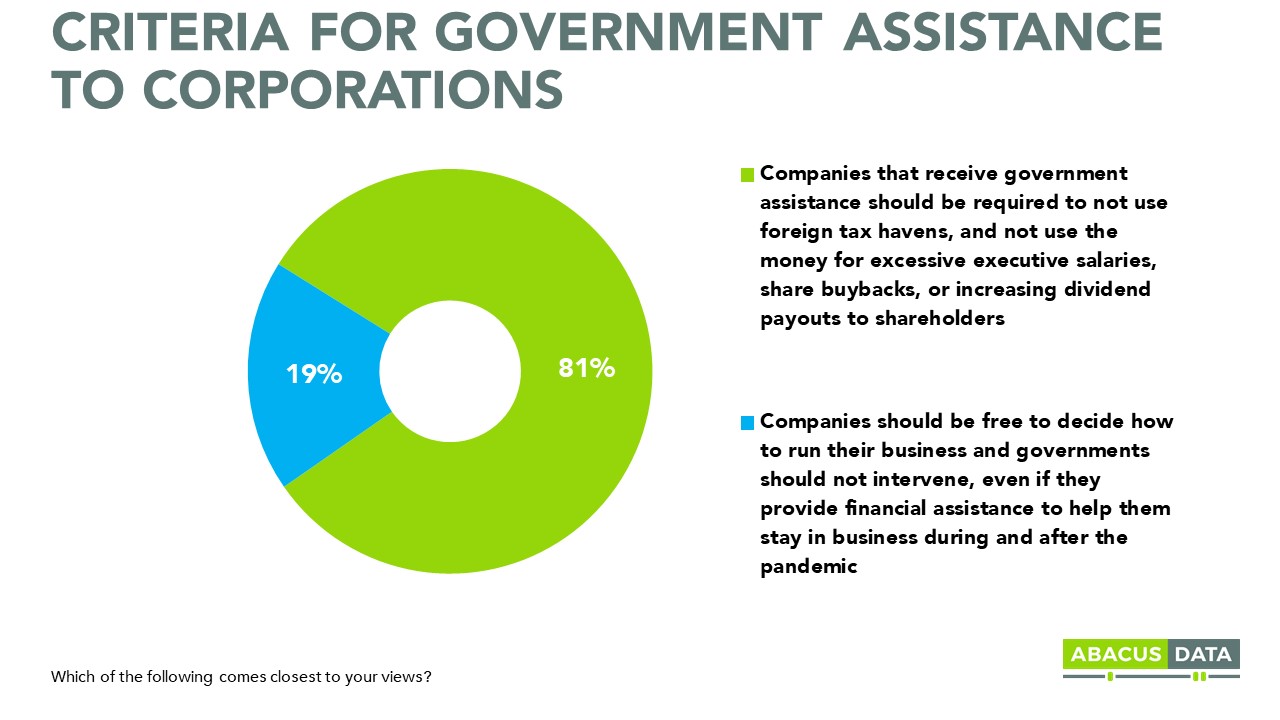
UPSHOT
The COVID-19 pandemic has caused widespread anxiety and concern for Canadians across the country. As they look ahead to the economic recovery, most are looking for a bold and ambitious recovery.
Canadians want a recovery that is fair and ensures the richest among them contribute and pay their share. A recovery that helps make Canada more self-sufficient and strengthens the public health care system. They want a recovery that ensures that corporations use public funds to support workers and not enrich executives or shareholders.
ABOUT ABACUS DATA
We are the only research and strategy firm that helps organizations respond to the disruptive risks and opportunities in a world where demographics and technology are changing more quickly than ever.
Find out more about what we are doing to help clients respond to the COVID-19 pandemic.
We are an innovative, fast-growing public opinion and marketing research consultancy. We use the latest technology, sound science, and deep experience to generate top-flight research-based advice to our clients. We offer global research capacity with a strong focus on customer service, attention to detail and exceptional value.
We were one of the most accurate pollsters conducting research during the 2019 Canadian Election.

Contact us with any questions.
Find out more about how we can help your organization by downloading our corporate profile and service offering.
METHODOLOGY
Our survey was conducted online with 2,280 Canadians aged 18 and over from May 1 to 6, 2020. A random sample of panellists was invited to complete the survey from a set of partner panels based on the Lucid exchange platform. These partners are double opt-in survey panels, blended to manage out potential skews in the data from a single source.
The margin of error for a comparable probability-based random sample of the same size is +/- 2.1%, 19 times out of 20. The data were weighted according to census data to ensure that the sample matched Canada’s population according to age, gender, educational attainment, and region. Totals may not add up to 100 due to rounding.



